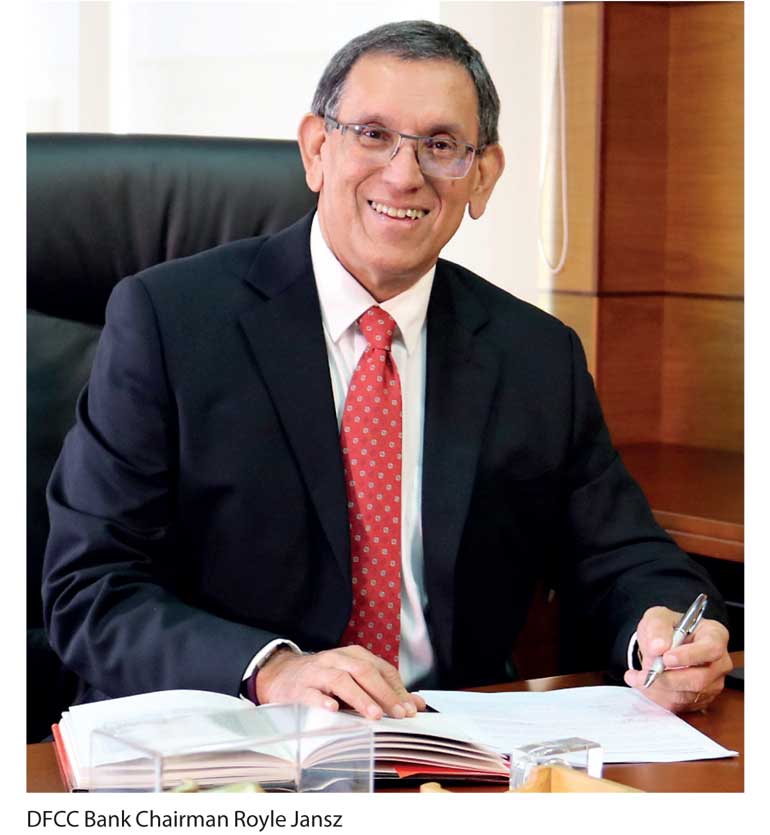Saturday Feb 21, 2026
Saturday Feb 21, 2026
Wednesday, 28 March 2018 00:00 - - {{hitsCtrl.values.hits}}

Q: Why does your annual report say that DFCC is the Bank for the Times?
A: DFCC is the ‘Bank for the Times’ because it is agile, responsive and powering ahead on a foundation of capital strength and a mindset of being a leader and in tune with the aspirations of all our customers. A Bank for the Times must move with the times; which is what DFCC Bank has been doing for over 60 years.
Q: Your annual report claims that DFCC is a Pioneer, Pathfinder and a Trailblazer. Can you explain?
A: DFCC Bank is a pioneer because it is one of the earliest development finance institutions in Asia, and the first in Sri Lanka. Since its inception in 1955, DFCC Bank has supported building the nation by pioneering many innovations in Sri Lanka’s financial sector.
The bank played a major role in the launch of Sri Lanka’s first unit trust, the National Equity Fund, acted as the executing agent, promoter and was one of three principal investors, it was instrumental in setting up the then biggest venture capital company, Lanka Ventures Ltd. by taking the larger equity stake along with Asian Development Bank and other investors in 1992, and in the formation of Lanka Industrial Estates (LINDEL) Ltd. as a public/private partnership to manage an industrial estate.
We are a Pathfinder because DFCC was the First Bank to be listed in 1956 on the Colombo Stock Exchange (when it was the Colombo Brokers’ Association) and the second Financial Institution to do so. The second bank to be listed was 14 years thereafter. Our shareholders cover a spectrum of local and foreign investors and include financial and non-financial corporates, investment funds, and individuals.
DFCC is a trailblazer because as the first development bank, it has been the financier of trail blazing Lankan entrepreneurs and an adder of value to the enterprises they built – particularly during their risky early stages. Many successful corporates in the business world today obtained their initial funding from DFCC.
Q: Why did the bank think it necessary to include this information in this year’s Annual Report?
A: Because public perception is that DFCC was a Government owned development bank which was subsequently privatised and is now no longer into development banking. This view has been put forward from time to time at various fora and in print and we believe it is time to correct this misconception once and for all.
DFCC has always been a listed company from as far back as 1956 and its shares have always been held by individual and institutional investors. Therefore the question of ‘privatisation’ does not arise.
When we received approval from the Central Bank of Sri Lanka to become a Commercial Bank in 2015, this was subject to DFCC’s commitment to maintaining a significant portion of project loans in our portfolio and to assist development projects while expanding our commercial banking business. At present, approximately 45% of our portfolio consists of development loans, and such lending contributes significantly to the growth of the economy.
We are still the preferred lender for ‘green’ development projects such as waste to energy, hydro, wind, and solar energy projects in addition to other large start up projects. The expertise of our project lending teams, honed by over six decades of experience in this field, is unmatched in the industry. We are still the reference bank and the first port of call for anyone with a great idea needing finances to bring it to fruition.
Q: What are your priorities as Chairman of DFCC Bank?
A: It is very simple. My role is strategy, people and governance.
The Board has approved strategic short and medium term plans and performance against these plans are monitored quarterly at Board level. The Board discusses strategy at every board meeting as ‘Strategic Discussion’ is an early agenda item.
Succession planning has been given priority by targeting focused career development programs for high potential staff and by establishing a committee headed by a Board Member to reorganise and improve the succession planning process for key management personnel.
We have strengthened practices by enhancing the scope of the board nomination committee to include governance. The Board sets the example for employees of the Bank by implementing the highest standards of business ethics and corporate governance.
A whistle blowing policy is in place and all members of staff are educated and encouraged to report any suspected wrong doing. The highest levels of authority in the bank including the Chairman, CEO and senior management are always accessible and information received is speedily investigated and actioned if found to be credible.
DFCC has an open door policy and, in addition, frequent open days are organised so that any member of the staff could meet the Chairman and CEO to discuss ideas or issues and concerns.
Q: What plans does the bank have for the next few years?
A: The bank has set itself a challenging plan for the next three years and the Board is confident that the CEO, Lakshman Silva and his team will deliver. Our people have confidence in themselves and their colleagues and have the desire to succeed. As I said earlier, we are a bank for the times. We are innovative and service oriented and dedicated to providing ‘excellence’ to our customers and optimising returns to our shareholders.